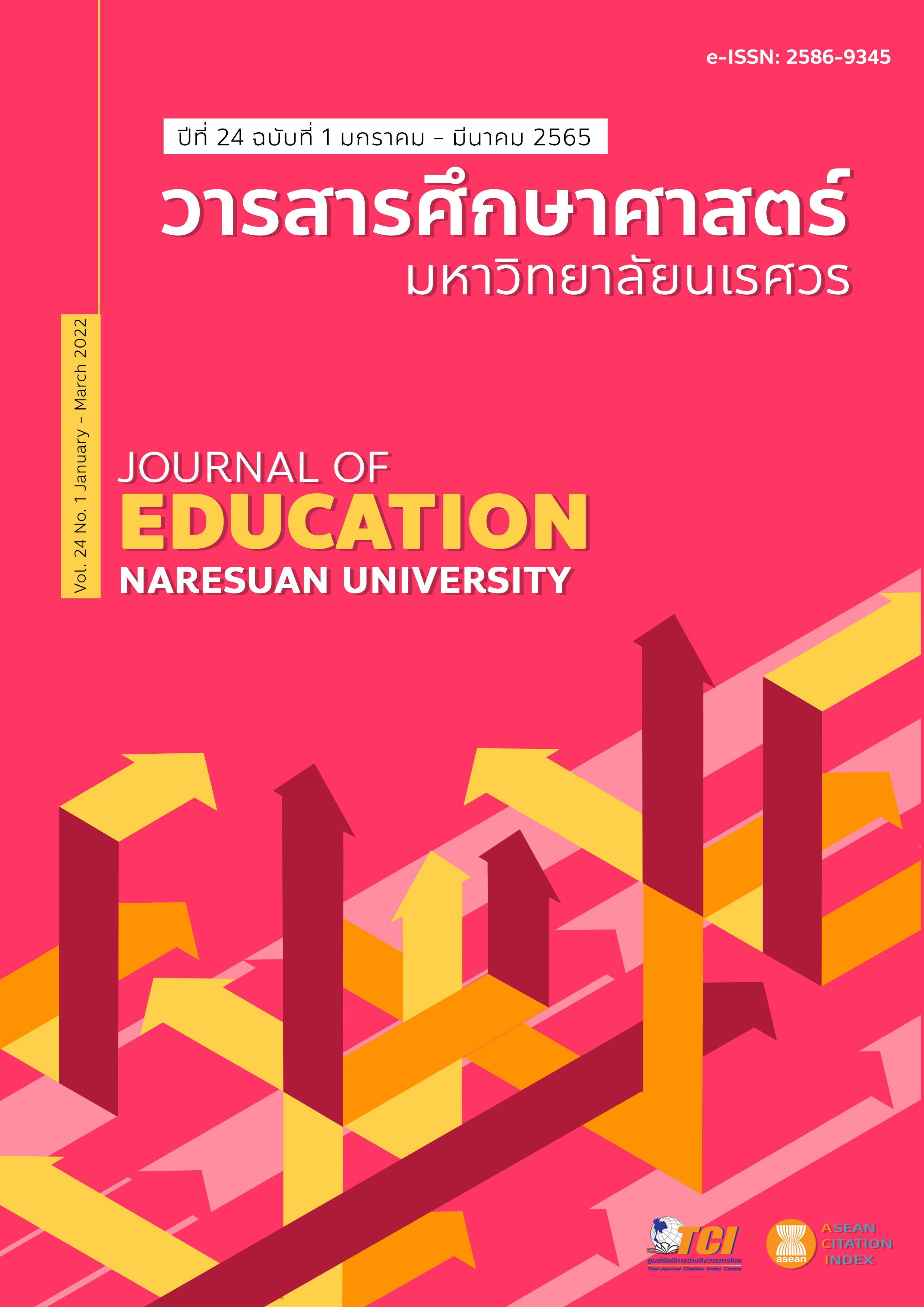การพัฒนาเครื่องมือประเมินสมรรถนะผู้บริหารโรงเรียนรุ่นใหม่ผู้สร้างนวัตกรและผู้ประกอบการในอนาคต THE DEVELOPMENT OF COMPETENCY ASSESSMENT TOOLS FOR NEW GENERATION SCHOOL ADMINISTRATOR: FUTURE INNOVATOR AND ENTREPRENEUR CREATOR
Main Article Content
บทคัดย่อ
การวิจัยครั้งนี้มีวัตถุประสงค์เพื่อ 1) ศึกษาองค์ประกอบของนวัตกรและผู้ประกอบการในอนาคตของนักเรียน 2) ศึกษาองค์ประกอบของผู้สร้างนวัตกรและผู้ประกอบการในอนาคตของผู้บริหาร และ 3) พัฒนาเครื่องมือประเมินสมรรถนะผู้บริหารโรงเรียนรุ่นใหม่ผู้สร้างนวัตกรและผู้ประกอบการในอนาคต ผู้ให้ข้อมูลประกอบด้วย 1) นักเรียนชั้นมัธยมศึกษา จำนวน 1,019 คน 2) ผู้ทรงคุณวุฒิด้านองค์ประกอบของผู้สร้างนวัตกรและผู้ประกอบการในอนาคตของผู้บริหาร จำนวน 14 คน และ 3) ผู้ทรงคุณวุฒิด้านการพัฒนาเครื่องมือประเมินสมรรถนะผู้บริหารโรงเรียนรุ่นใหม่ผู้สร้างนวัตกรและผู้ประกอบการในอนาคต จำนวน 5 คน ผลการวิจัยพบว่า 1) องค์ประกอบของนวัตกรและผู้ประกอบการในอนาคตของนักเรียน ประกอบด้วย 9 องค์ประกอบ คือ การตั้งคำถาม การสังเกต การเป็นนักบันทึก การมองเห็นความเชื่อมโยง การแสวงหาทางเลือกที่หลากหลาย เครือข่ายความคิด การทดลอง ความเป็นผู้นำผู้ประกอบการเชิงนวัตกรรม และความรับผิดชอบต่อความยั่งยืน ทางสังคม เศรษฐกิจ และสิ่งแวดล้อม 2) องค์ประกอบของผู้สร้างนวัตกรและผู้ประกอบการในอนาคตของผู้บริหาร ประกอบด้วยสมรรถนะ 3 กลุ่ม คือ สมรรถนะนวัตกรและผู้ประกอบการ สมรรถนะการส่งเสริมและสนับสนุนการเรียนรู้ของผู้เรียน และสมรรถนะการนำองค์กรแห่งนวัตกรรม และเครื่องมือประเมินสมรรถนะผู้บริหารโรงเรียนรุ่นใหม่ผู้สร้างนวัตกรและผู้ประกอบการในอนาคต ประกอบด้วย 3 เครื่องมือ คือ แบบประเมินสมรรถนะนวัตกรและผู้ประกอบการของผู้บริหารสถานศึกษา สถานการณ์จำลองเพื่อประเมินสมรรถนะการส่งเสริมและสนับสนุนการเรียนรู้ของผู้เรียน และสถานการณ์จำลองเพื่อประเมินสมรรถนะการนำองค์กรแห่งนวัตกรรม
Article Details

อนุญาตภายใต้เงื่อนไข Creative Commons Attribution-NonCommercial-NoDerivatives 4.0 International License.
เจ้าของบทความมิได้คัดลอก หรือละเมิดลิขสิทธิ์ของผู้ใด หากเกิดการละเมิดลิขสิทธิ์ ไม่ว่าวิธีใด หรือการฟ้องร้องไม่ว่ากรณีใด ๆ ที่อาจเกิดขึ้นได้ กองบรรณาธิการวารสารศึกษาศาสตร์ ไม่มีส่วนเกี่ยวข้องทั้งสิ้น ให้เป็นสิทธิ์ของเจ้าของบทความที่จะดำเนินการ
เอกสารอ้างอิง
Chaemchoy, S. (2020). The development of school management innovation for enhancing innovator competencies of secondary school students. Journal of Education Naresuan University, 22(2), 193-213. [in Thai]
Deal, T. E., & Peterson, K. D. (1999). Shaping school culture: The heart of leadership. San Francisco, CA: Jossey-Bass.
Dutta, S., Lanvin, B., & Wunsch-Vincent, S. (2019). The global innovation index. Ithaca, NY: Cornell, INSEAD, & WIPO.
Fontana, A., & Musa, S. (2017). The impact of entrepreneurial leadership on innovation management and its measurement validation. International Journal of Innovation Science, 9(1), 2-19.
Greenberg, D., McKone-Sweet, K., & Wilson, H. J. (2011). The new entrepreneurial leader: Developing leaders who shape social and economic opportunity. San Francisco, CA: Berrett-Koehler.
Gupta, V., MacMillan, I. C., & Surie, G. (2004). Entrepreneurial leadership: Developing and measuring a cross-cultural construct. Journal of Business Venturing, 19(2), 241-260. DOI:10.1016/s0883-9026(03)00040-5
Hallinger, P., & Murphy, J. F. (1986). The social context of effective schools. American Journal of Education, 94(3), 328-355.
Jueasrikul, S. (2017). IDE Center promotes "Innovation" as the future of modern entrepreneurs. Retrieved from https://themomentum.co/successful-feature-ide-center-invention-x-commercialization/
Kajornsilp, B. (2005). Research methodology. Bangkok: Physics Center Printing. [in Thai]
Kanjanawasee, S. (2013). Traditional test theory (7th ed.). Bangkok: Chulalongkorn University Press. [in Thai]
National Science and Technology Development Agency. (2016). Thailand 4.0 Blueprint: A model driving Thailand towards; Security, Prosperity, and Sustainability. Retrieved from https://waa.inter.nstda.or.th/stks/pub/2017/20171114-draeqa-blueprint.pdf
Ngigi, S., McCormick, D., & Kamau, P. (2018). Entrepreneurial leadership competencies in the 21st century: An empirical assessment. DBA Africa Management Review, 8(2), 1-17.
Nielsen, J. A. (2015). Assessment of innovation competency: A thematic analysis of upper secondary school teachers’ talk. The Journal of Educational Research, 108(4), 318-330.
Office of the Education Council. (2019). National Education Standards B.E. 2561. Bangkok: 21 Century Printing. [in Thai]
Rea, D. C., Carter, C. F., Wilkerson, J. R., Valesky, T. C., & Lang, W. S. (2011). Assessing ISLLC-based dispositions of educational leadership candidates. International Journal of Educational Leadership, 69(3), 1-15.
Thawesaengskulthai, N. (2019). Education for young innovators and innovative entrepreneurs. Nonthaburi: Wacharin P.P. Printing. [in Thai]
Zarefard, M., & Cho, S. E. (2018). Entrepreneurs' managerial competencies and innovative start-up intentions in university students: focus on mediating factors. International Journal of Entrepreneurship, 22(2), 1-22.


